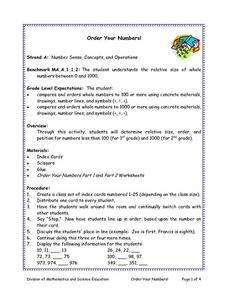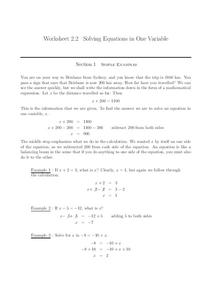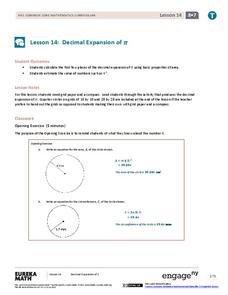DK Publishing
Sneaky Snakes: Counting, Part 2
Hissss! Practice counting forwards and backwards with a sly assignment. Eight snakes feature number sequences that are missing a few numbers. The beginning numbers vary, and some snakes require counting down. Learners write in the...
BBC
Reception
A nice lesson on recognizing and counting from one to nine is here for you. In it, learners hold up number cards which reflect the number of monkeys who are left during a reading of the story, "How Many Monkey's Left?" A simple lesson...
Curated OER
Knowledge Rating Scale Vocabulary Activity #2 Bud, Not Buddy
As your kids read chapters nine through eleven, present them with this vocabulary chart. Nine vocabulary words are shown, and pupils must decide if they know it well, have heard it, or have no clue what it means. Consider re-creating...
Curated OER
Addition Workbook
In this addition worksheet, students complete addition facts with numbers 1 through 9, use a hundreds chart, complete word problems, and more. Students complete activities on 20 pages.
Curated OER
Linear Inequalities
Students solve linear inequalities. In this solving linear inequalities lesson, students solve one step inequalities algebraically. Students graph the solutions on a number line. Students compare the graphs of various inequalities such...
Curated OER
Branches of Government
Students explore the three branches of government. In this government and U.S. history lesson, students listen to a story about a boy who attempts to sponsor a bill to ban cartoons. Students interview three teachers who each represent...
Mathematics Vision Project
Quadratic Equations
Through a variety of physical and theoretical situations, learners are led through the development of some of the deepest concepts in high school mathematics. Complex numbers, the fundamental theorem of algebra and rational exponents...
Math Stars
Math Stars: a Problem-Solving Newsletter Grade 8
You've just hit the jackpot of integrating math problems and riddles with this jumbo-sized resource! Written as a newsletter, scroll through 35 pages of puzzles and quality problems to engage and encourage your learners to inquire...
Curated OER
What Do You See at the Pond?
With What Do You See at the Pond?, young readers explore pond life and practice reading strategies. Learners first make predictions and then read the simple story independently. After a second read-through with a partner, kids come...
Curated OER
Counting Fun with Gummi Bears
Students count the numbers one through ten out loud and show the numbers using manipulatives.
Curated OER
Investigating Exponents
In these exponents worksheets, 7th graders complete a table for numbers one through ten and their eight exponents. Students then examine the units digit of the entries in each table. Students look for patterns.
Curated OER
Learning Numbers
Pupils draw circles according to the number that they see. In this counting lesson plan, students have to draw the amount of circles that represent the numbers they see.
Curated OER
Order Your Numbers
Students examine the order of whole numbers that range from 0 to 1,000. They compare and contrast the quantities of different numbers using the number line, objects, and symbols of comparison. Students also work as a class with cards to...
Curated OER
Solving Equations in One Variable
In this solving equations in one variable worksheet, students solve 38 simple and complex equations. Students then write and solve equations for 6 word problems.
Charleston School District
Scientific Notation Operations
How do you operate with numbers in scientific notation? The resource provides examples on how to divide and multiply with numbers written in scientific notation. The handout and video also cover the procedure for addition and subtraction...
West Contra Costa Unified School District
Simplifying Fractions Activity
Warm-up pupils' fraction muscles with a four-question quiz, then delve into a learning game designed to reinforce the concept of simplifying fractions. Based on the "I do, We do, You do" method of teaching, the lesson directly...
Curated OER
Adding & Subtracting (Combining) Integers
Maintain a positive atmosphere in your math class with this fun lesson on adding and subtracting integers. After first explaining the rules for combining positive and negative numbers, this resource uses a comic strip...
EngageNY
Decimal Expansion of Pi
Develop a better understanding of the value of pi. Learners explore the area of a circle using estimation and graph paper. While continuing to estimate the area of the circle using smaller and smaller grids, the number pi emerges.
Curated OER
Prime Factorization: Finding Factors in the Fifth Grade
The lesson starts out with a brain drain, which is a great way to get students to activate prior knowledge and build lasting connections. They tell everything they know about prime factorization, use their knowledge to...
Curated OER
Find the Difference Between Two Numbers
Perfect for younger elementary learners, this slide-show uses images of unifix cubes to show the process of subtraction. There is a complete example and five practice problems learners can complete as you progress through the resource.
Lorain County Community College
Fractions Part Three
See how well your mathematicians know their fractions with a challenging worksheet full of different problems. It's all there with adding, subtracting, multiplying, and division. They will be proficient with order of operations and...
Curated OER
Multiplying with Egg O
Third graders multiply whole numbers by one and two digit numbers using base ten blocks and Egg O multiplication game. students pass out egg cartons, counters, and a record sheet to each group.
Curated OER
Times Tables Cards
For this math activity, students cut out 110 multiplication cards. The cards include the question and answer for times tables one through ten.
Curated OER
Adding Up
Sail through the land of three addends with this nautical-themed addition learning exercise. Scholars begin by using mental math to add seven sets of three numbers located on sailboats. Next, they apply this concept to eight horizontally...























